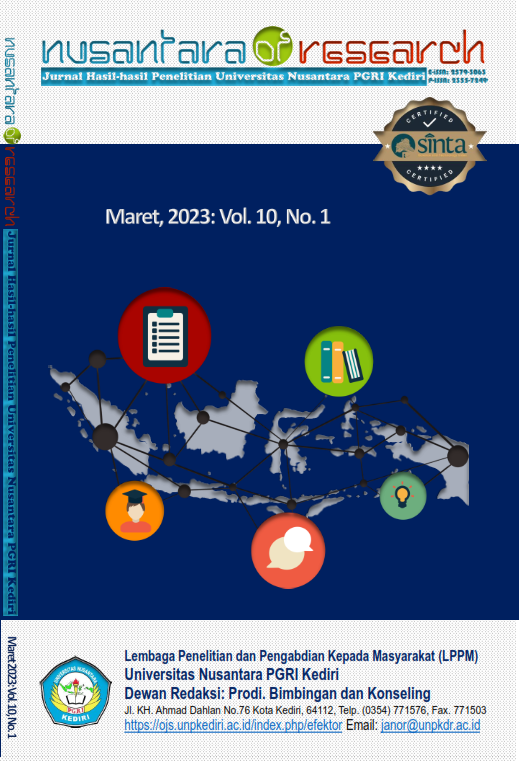The Influence of Self-Efficacy and Self-Management in The Implementation of Guidance and Counseling Services at SMP N in Jambi City
Main Article Content
Abstract
These are the objectives of this study: 1) To determine the extent to which self-efficacy influences the implementation of guidance and counselling at SMP N in Jambi City; 2) To determine the extent to which self-management influences the implementation of guidance and counselling at SMP N in Jambi city, and 3) To determine the direct influence of self-efficacy and self-management on the implementation of guidance and counselling at SMPN in Jambi City. The research design utilized in this study was quantitative, with multiple linear regression analysis serving as the expo-facto statistical test design. This study's population consisted of school counsellors at the State Junior High School in Jambi city. As for the findings of this study: 1. The self-efficacy variable (X1) has no effect on school services (Y). It is evidenced by the results of 0.146 > 0.05 and t count -1.464< t in table 1; 2. There is an influence of the self-management variable (X2) on services in schools (Y), as evidenced by the results of 0.000< 0.05 and t count 4.360 > t in table 1.98; 3. There is a simultaneous effect of self-efficacy (X)1 and self-management (X2) on services in schools (Y), 0.000< 0.005. It indicates that variables have a simultaneous relationship
Downloads
Article Details
Issue
Section
Authors who publish with this journal agree to the following terms:
- Copyright on any article is retained by the author(s).
- The author grants the journal, the right of first publication with the work simultaneously licensed under a Creative Commons Attribution License that allows others to share the work with an acknowledgment of the work’s authorship and initial publication in this journal.
- Authors are able to enter into separate, additional contractual arrangements for the non-exclusive distribution of the journal’s published version of the work (e.g., post it to an institutional repository or publish it in a book), with an acknowledgment of its initial publication in this journal.
- Authors are permitted and encouraged to post their work online (e.g., in institutional repositories or on their website) prior to and during the submission process, as it can lead to productive exchanges, as well as earlier and greater citation of published work.
- The article and any associated published material is distributed under the Creative Commons Attribution-ShareAlike 4.0 International License
How to Cite
References
Amelia, R. P., Filiani, R., & Herdi, H. (2014). 06 Self-efficacy Terhadap Penggunaan Teknologi Informasi dan Komunikasi Dalam Layanan Bimbingan dan. Insight: Jurnal Bimbingan Dan Konseling, 3(1), 106–110. https://doi.org/https://doi.org/10.21009/INSIGHT.031.18
Armstrong, C. (2015). Organization Development. Human Resource Development, 103–115. https://doi.org/10.1007/978-1-137-36010-6_6
Asrori, M., & Tjalla, A. (2018). The Effectiveness of Self-management Strategy of Cormier & Cormier Model to Increase Academic Self-efficacy of High School Students. American Journal of Educational Research, 6(6), 816–821. https://doi.org/10.12691/education-6-6-34
Azwar, S. (2010). Metode Penelitian. Pustaka Pelajar.
Bardhoshi, G., & Um, B. (2021). The Effects of Job Demands and Resources on School Counselor Burnout: Self-Efficacy as a Mediator. Journal of Counseling and Development, 99(3), 289–301. https://doi.org/10.1002/jcad.12375
Cohen, L., Manion, L., Morrison, K., & Wyse, D. (2010). A Guide to Teaching Practice. In A Guide to Teaching Practice. https://doi.org/10.4324/9780203848623
Corey, G. (2015). Theory and Practice of Counseling and Psychotheraphy, Eighth Edition. In Acta Universitatis Agriculturae et Silviculturae Mendelianae Brunensis (Vol. 53, Issue 9).
Garson, G. D. (2018). Partial Least Squares. In Multi-Label Dimensionality Reduction. https://doi.org/10.1201/b16017-6
Hanan, A. (2017). Meningkatkan Motivasi Belajar Bimbingan konseling Siswa Kelas VIII.C Melalui Bimbingan Kelompok Semester Satu Tahun Pelajaran 2015/2016. 3(1), 62–72.
Hariko, R. (2016). Ilmu Bimbingan dan Konseling, Nilai dan Kesejahteraan Individu: Studi Literatur. Jurnal Konseling Dan Pendidikan, 118–123.
Idrus, A., & Setiyadi, B. (2021). The Effect of Self-Efficacy and Entrepreneurship on Managers’ Professionalism and Performance in Jambi Community Learning Centers. Performance Improvement Quarterly, 34(1), 31–53. https://doi.org/10.1002/piq.21341
Lorig K R, & Holman H R. (2003). Self Management Education: History, Definition, Outcomes and Mechanisms. Annals of Behavioral Medicine, 26(1), 1–7. http://www.springerlink.com/index/96t1713736v23t27.pdf
McGowan, P. (2005). Self-Management: a Background Paper. New Perspectives: International Conference on Patient Self-Management, 1–10.
Prayitno dan Amti. (2018). Dasar-dasar bimbingan dan konseling. Rineka Cipta. https://opac.perpusnas.go.id/DetailOpac.aspx?id=1135788#
Rahmi, R. (2020). INOVASI PEMBELAJARAN DI MASA PANDEMI COVID-19. December. https://doi.org/10.24235/ath.v
Rod K. Dishman, Robert W. Motl, James F. Sallis, Andrea L. Dunn, Amanda S. Birnbaum, Greg J. Welk, PhD, Ariane L. Bedimo-Rung, PhD, C. C., & Voorhees, and J. B. J. (2006). Self-Management Strategies Mediate Self-Efficacy and Physical Activity. Bone, 23(1), 1–7.
Tomás, J. M., Gutiérrez, M., Georgieva, S., & ... (2020). The effects of self‐efficacy, hope, and engagement on the academic achievement of secondary education in the Dominican Republic. Psychology in the …. https://doi.org/10.1002/pits.22321
Wahyuni, F., & Kurniawan, C. (2022). Asesmen Self-Efficacy Konselor dalam Konseling : Pengembangan dan Validasi. Bulletin of Counseling and Psychotherapy, 4(2), 235–241. https://doi.org/10.51214/bocp.v4i2.196
Wester, K. L., Vaishnav, S., Morris, C. W., Austin, J. L., Haugen, J. S., Delgado, H., & Umstead, L. K. (2020). Interaction of Imposter Phenomenon and Research Self-Efficacy on Scholarly Productivity. Counselor Education and Supervision, 59(4), 316–325. https://doi.org/10.1002/ceas.12191
Young, R., & Ferguson, F. (2021). Writing for pleasure. In Inspiring Primary Learners: Insights and Inspiration Across the Curriculum. https://doi.org/10.4324/9780429024597-17




